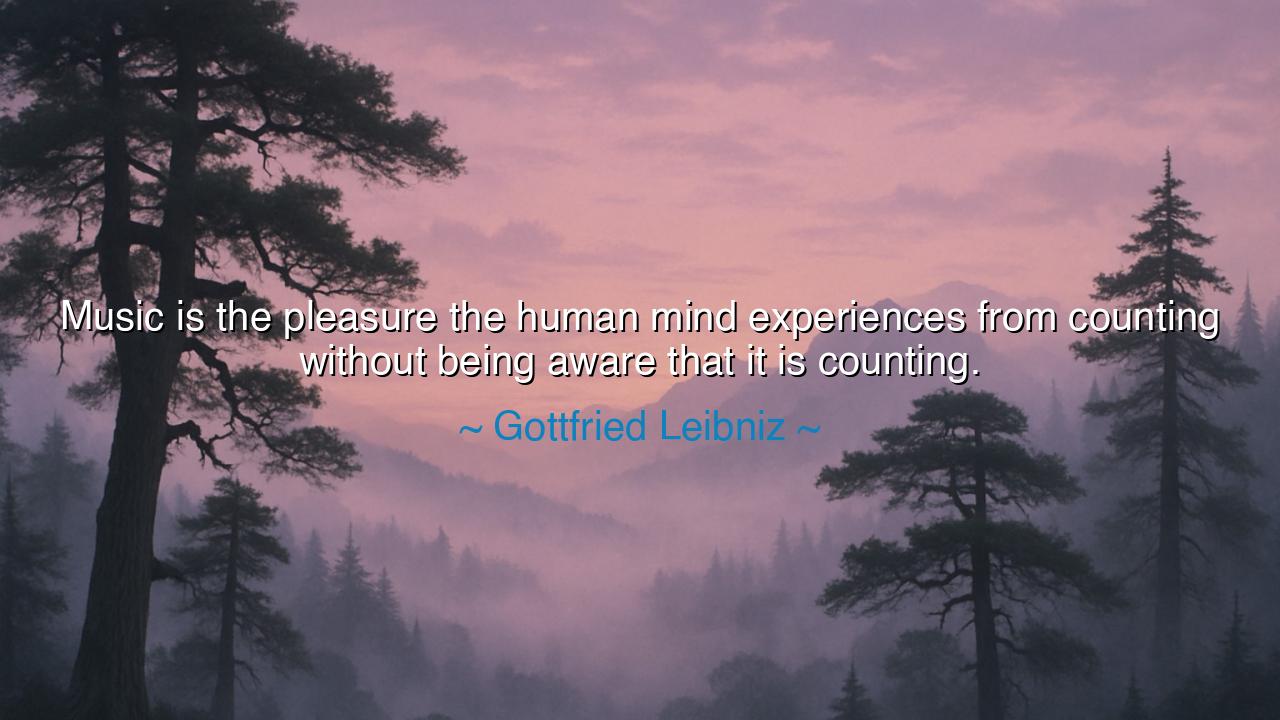
Music is the pleasure the human mind experiences from counting
Music is the pleasure the human mind experiences from counting without being aware that it is counting.






Hear the profound words of Gottfried Wilhelm Leibniz, philosopher and mathematician, who declared: “Music is the pleasure the human mind experiences from counting without being aware that it is counting.” In this vision, he reveals a mystery that unites the realms of science and spirit. For music, though born of rhythm and measure, is not felt by us as numbers, but as joy. The human mind delights in patterns, in symmetry, in harmony—and yet it delights unconsciously, unaware that it is doing the work of calculation. Music is thus both reason and rapture, intellect and ecstasy, the hidden marriage of mathematics and the soul.
To say that music is counting without awareness is to unveil the structure behind the beauty. Every note is placed in time, every chord is a ratio, every rhythm a repetition of divisions. The ancients discovered this long ago. Pythagoras, listening to the sounds of hammers striking anvils, realized that harmonious tones arose from simple mathematical ratios of string lengths. To him, music was a reflection of the order of the cosmos itself—the “music of the spheres.” Yet when we listen, we do not hear ratios or equations; we hear a song that stirs our heart. What begins as number becomes wonder.
Consider the story of Johann Sebastian Bach. His compositions were built on intricate patterns of counterpoint, fugues layered with mathematical precision. And yet, when heard, they transcend calculation, filling the listener with awe and devotion. Bach was both mathematician and mystic, weaving numbers into a tapestry of praise. This is the essence of Leibniz’s insight: music hides its arithmetic beneath a veil of beauty, so that what is strict becomes free, and what is exact becomes infinite.
The meaning of this quote also speaks to the nature of human joy. The mind craves order, but it also craves mystery. Music satisfies both at once. It gives us the comfort of pattern without forcing us to see its skeleton. We sway to rhythm, we rejoice in harmony, but we rarely stop to think: “I am counting beats.” This hidden harmony between intellect and feeling is what gives music its power to move us more deeply than words alone.
History shows us how music has often been a bridge between the rational and the emotional. During the Enlightenment, when science rose to prominence, music flourished as proof that beauty could be born from order. The works of Mozart and Haydn show a balance of elegance and clarity, structures so exact yet so graceful that they seemed to mirror both mathematics and human joy. In their music, listeners found the pleasure of counting without knowing, order transformed into delight.
The lesson here is clear: do not despise structure, for within it lies beauty. Do not think of mathematics as cold, for in its hidden heart burns the flame of music. And do not think of music as mere chaos of emotion, for its roots are planted in number and proportion. The greatest wisdom lies in uniting both, letting reason guide passion, and passion bring warmth to reason.
Therefore, beloved seeker, let this teaching shape your path. If you are drawn to structure, let yourself also embrace beauty; if you are drawn to beauty, remember that order sustains it. In your work, in your art, in your life, strive to join reason and feeling as music joins mathematics and joy. For in this union lies not only harmony but also the fullest expression of the human spirit.
And so remember Leibniz’s insight: music is pleasure born of hidden counting. It is the secret joy of the mind, wrapped in the sweetness of the heart. To live as music lives is to bring together discipline and delight, law and freedom, number and soul—so that all your days may be a melody both measured and eternal.






AAdministratorAdministrator
Welcome, honored guests. Please leave a comment, we will respond soon